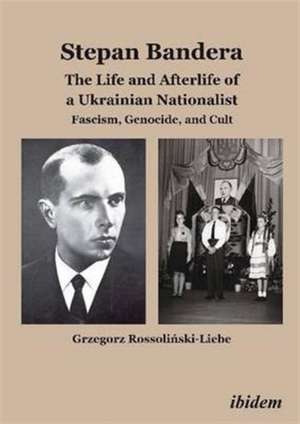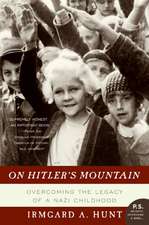Stepan Bandera -- The Life & Afterlife of a Ukrainian Nationalist: Fascism, Genocide & Cult
Autor Grzegorz Rossolinski-Liebeen Limba Engleză Paperback – 15 oct 2014
Preț: 333.05 lei
Nou
Puncte Express: 500
Preț estimativ în valută:
63.73€ • 65.75$ • 53.18£
63.73€ • 65.75$ • 53.18£
Carte tipărită la comandă
Livrare economică 22-28 martie
Preluare comenzi: 021 569.72.76
Specificații
ISBN-13: 9783838206042
ISBN-10: 3838206045
Pagini: 670
Dimensiuni: 170 x 240 x 45 mm
Greutate: 1.21 kg
Editura: Ibidem Press/Ibidem-Verlag
Colecția Ibidem Press/Ibidem-Verlag
ISBN-10: 3838206045
Pagini: 670
Dimensiuni: 170 x 240 x 45 mm
Greutate: 1.21 kg
Editura: Ibidem Press/Ibidem-Verlag
Colecția Ibidem Press/Ibidem-Verlag
Recenzii
This important, heavily documented and rigorously researched book could not be published at a better time. Arguing that Stepan Bandera, leader of the radical faction of the Organization of Ukrainian Nationalists (OUN), was motivated by a fascist worldview, the author shows that the OUN's specific goal was to create an independent and ethnically homogeneous Ukraine, free of Russian-Bolshevik, Polish, and Jewish influence, and led by a charismatic dictatorial leader at the head of a single party. The author exposes the intimate links between the OUN and Nazi Germany as well as its violent ethnic cleansing of Poles in Western Ukraine and its collaboration with the Germans in the genocide of the Jews, all actions for which Bandera acted as the leading spirit even from his German imprisonment. Many Ukrainians will find this argument, meticulously documented and persuasively argued, deeply troubling. Yet it is a case that needs to be made and which this book accomplishes with such energy and breadth. -- Omer Bartov, History Professor at Brown University
This book is bound to generate debate, since it confronts a man and movement of mythic stature with their difficult historical context and with masses of documentary evidence. It is a pioneering effort to situate Stepan Bandera and his Organization of Ukrainian Nationalists within a history of fascism and ethnic cleansing. Bandera and his movement exercised a powerful influence on the mental framework of modern Ukrainian nationalism in Western Ukraine and the overseas diaspora and even, more indirectly, on the academic discipline of Ukrainian studies. What is written here requires reflection and engagement; it makes a major contribution to the discourse on the meaning of modern Ukrainian history.-- John-Paul Himka, Professor of History at the University of Alberta
This fascinating and well-researched monograph provides a comprehensive account of the political career of the Ukrainian nationalist leader Stepan Bandera and of the cult that has come to surround his personality. It is essential reading for all those interested in the history of Eastern Europe during the Second World War and subsequently. -- Antony Polonsky, Albert Abramson Professor of Holocaust Studies at Brandeis University
For more than half a century after his death Stepan Bandera has been for many Ukrainians the hero of the liberation movement. On the basis of Bandera's biography, Grzegorz Rossolinski-Liebe records the history of Ukrainian militant nationalism throughout the twentieth century, the changing relationship between the movement and German National Socialism, and its collaboration with Western secret services. The Bandera cult, this study shows, is part of the highly controversial politics of memory dividing Ukraine once more into East and West. -- Susanne Heim, Institute of Contemporary History Berlin and Munich
Grzegorz Rossolinski-Liebe has written a thought-provoking book about the life and afterlife of a controversial figure of the Ukrainian radical right wing, Stepan Bandera. In particular, his chapters on Bandera's interwar Polish period, the postwar Soviet persecution of Bandera partisans, and the evolution of Soviet ideology about Bandera contribute much that is novel and challenging to the former prevailing narratives. Much information is based on recently accessible archival collections. -- Mark von Hagen, Arizona State University
Grzegorz Rossolinski-Liebe's comprehensive book on Stepan Bandera, leader of the far-right Organization of Ukrainian Nationalists (OUN), transcends the confines of a conventional biography. It is an important, heavily documented study of the OUN's ideology and its attempts to create an ethnically homogeneous Ukrainian nation-state. Rossolinski-Liebe shows that, despite the OUN's fascination with fascism and mass violence, the relationship between Nazi Germany and the OUN, especially between 1941 and 1944, was complicated and equivocal. During the Cold War, the radical nationalism and anti-bolshevism cherished and advocated by the OUN still shaped the ideology and policy aims of many Ukrainian refugees in countries such as Canada, the UK, the USA, and West Germany. Placing Bandera's activities in the contexts of occupation, extreme nationalism, fascism, and anti-communism, the monograph is a major contribution to scholarship on twentieth-century Ukrainian and European history. -- Arnd Bauerkamper, Free University of Berlin
This book is bound to generate debate, since it confronts a man and movement of mythic stature with their difficult historical context and with masses of documentary evidence. It is a pioneering effort to situate Stepan Bandera and his Organization of Ukrainian Nationalists within a history of fascism and ethnic cleansing. Bandera and his movement exercised a powerful influence on the mental framework of modern Ukrainian nationalism in Western Ukraine and the overseas diaspora and even, more indirectly, on the academic discipline of Ukrainian studies. What is written here requires reflection and engagement; it makes a major contribution to the discourse on the meaning of modern Ukrainian history.-- John-Paul Himka, Professor of History at the University of Alberta
This fascinating and well-researched monograph provides a comprehensive account of the political career of the Ukrainian nationalist leader Stepan Bandera and of the cult that has come to surround his personality. It is essential reading for all those interested in the history of Eastern Europe during the Second World War and subsequently. -- Antony Polonsky, Albert Abramson Professor of Holocaust Studies at Brandeis University
For more than half a century after his death Stepan Bandera has been for many Ukrainians the hero of the liberation movement. On the basis of Bandera's biography, Grzegorz Rossolinski-Liebe records the history of Ukrainian militant nationalism throughout the twentieth century, the changing relationship between the movement and German National Socialism, and its collaboration with Western secret services. The Bandera cult, this study shows, is part of the highly controversial politics of memory dividing Ukraine once more into East and West. -- Susanne Heim, Institute of Contemporary History Berlin and Munich
Grzegorz Rossolinski-Liebe has written a thought-provoking book about the life and afterlife of a controversial figure of the Ukrainian radical right wing, Stepan Bandera. In particular, his chapters on Bandera's interwar Polish period, the postwar Soviet persecution of Bandera partisans, and the evolution of Soviet ideology about Bandera contribute much that is novel and challenging to the former prevailing narratives. Much information is based on recently accessible archival collections. -- Mark von Hagen, Arizona State University
Grzegorz Rossolinski-Liebe's comprehensive book on Stepan Bandera, leader of the far-right Organization of Ukrainian Nationalists (OUN), transcends the confines of a conventional biography. It is an important, heavily documented study of the OUN's ideology and its attempts to create an ethnically homogeneous Ukrainian nation-state. Rossolinski-Liebe shows that, despite the OUN's fascination with fascism and mass violence, the relationship between Nazi Germany and the OUN, especially between 1941 and 1944, was complicated and equivocal. During the Cold War, the radical nationalism and anti-bolshevism cherished and advocated by the OUN still shaped the ideology and policy aims of many Ukrainian refugees in countries such as Canada, the UK, the USA, and West Germany. Placing Bandera's activities in the contexts of occupation, extreme nationalism, fascism, and anti-communism, the monograph is a major contribution to scholarship on twentieth-century Ukrainian and European history. -- Arnd Bauerkamper, Free University of Berlin
Notă biografică
Grzegorz Rossolinski-Liebe is a Postdoctoral Fellow at the Friedrich-Meinecke-Institut of the Free University of Berlin.







